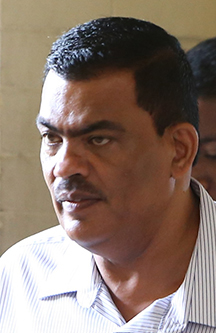Justice Navindra Singh on Tuesday ordered the prosecution to produce within five days a forensic audit report into the Guyana Rice Development Board (GRDB) otherwise there would be a permanent stay of prosecution against fraud accused Madanlall Ramraj.
The matter is returnable for tomorrow and raises a number of questions as a similar application before Acting Chief Justice Roxane George had been dismissed. Ramraj was one of six persons charged with fraud as a result of investigations stemming from the forensic audit report.
Justice Singh in his order said that the failure of the prosecution to disclose a copy of the forensic audit report which was instrumental in investigations launched by the Special Organised Crime Unit and the eventual charge against Ramraj “constitutes a violation of Article 144 of the Constitution of the Cooperative Republic of Guyana, more particularly, the right of the Applicant to be afforded facilities for the preparation of his defence and other protections of the law secured under and guaranteed by the said Article 144.
Ramraj was represented by attorneys Anil Nandlall, Manoj Narayan and Rajendra Jaigobin while the Attorney General was represented by Oneka Archer-Caulder.
Last Friday, Justice George dismissed applications made by two of the six GRDB fraud to have the charges against them quashed. The pleading were similar to those made on behalf of Ramraj.
Former Deputy Permanent Secretary of the Ministry of Agriculture Prema Ramanah-Roopnarine and business consultant Badrie Persaud based their applications before the Chief Justice on the failure of the prosecution to disclose a copy of the forensic audit report to them.
Stabroek News was told that in delivering an oral ruling, the Chief Justice said it was not necessary for her to do the trial magistrate’s work since it was in the domain of the magistrate to act upon the refusal of the prosecution to provide the audit report as she had previously ordered.
In separate applications filed on their behalf by attorney-at-law Sase Gunraj, Ramanah-Roopnarine and Persaud asked the court for a declaration that the failure of the prosecution to disclose a copy of the report, which was prepared by Chartered Accountant Nigel Hinds and which formed the basis for certain investigations launched by the Special Organised Crime Unit (SOCU), constituted a violation of Article 144 of the Constitution, and, in particular, the right of the applicants to be afforded facilities for the preparation of their defence and other protections of the law secured under and guaranteed by Article 144.
They also asked the court to grant an order for a “permanent stay of proceedings,” quashing, vacating or setting aside the charges of fraudulent omission against them.
The Attorney General of Guyana was listed as the respondent.
Ramanah-Roopnarine and Persaud were charged separately on May 19th, 2017 and placed on $500, 000 bail each.
It was alleged that with intent to defraud, they and others between January 1, 2011 and December 31, 2011, at Lot 116 to 117 Cowan Street, Kingston, being members of the GRDB, a body corporate, omitted or concurred in omitting from the organisation’s general ledger any entries particular to the sum of $52,000,000 in the Republic Bank (Guyana) account for its Agriculture Life Skills Programme. They both entered not guilty pleas. They were jointly charged with Ramraj, Dharamkumar Seeraj, Nigel Dharamall and Jagnarine Singh.
The application by Ramanah-Roopnarine and Persaud had noted that on July 11th, 2017, the prosecution served about 18 statements from various persons upon the applicants and a perusal of the documents found that the audit report was the basis upon which charges were proffered.
Trial Magistrate Leron Daly, the applicants said, proceeded with two of the matters and stayed the others. Following the commencement of the trial, they added, four witnesses, including Hinds, were called by the prosecution to testify.
On each occasion that testimony was given, an application was made for an order directing the prosecution to disclose the forensic audit report.
“On each occasion, the Prosecution responded by proffering various reasons for their failure to disclose the said Forensic Audit Report. Initially, the Prosecution stated that they were not in possession of a copy of the said report and therefore could not provide same,” the applicants averred in their court documents.
It was stated that eventually the magistrate after hearing arguments from both the defence and the prosecution ordered that a copy of the report be delivered to the defence.
The prosecution gave an undertaking to comply with the court’s instruction.
Hinds had testified in January to preparing the forensic audit report. At that point, a renewed application for disclosure of the said report was made and the prosecution was again ordered to comply.
After the prosecution indicated to the court that it was not in possession of the report, a copy of the document was presented to the prosecution by Hinds and an adjournment to look at the document was sought.
“On the adjourned date, the Prosecution informed the Court that it was not willing to disclose the entire report, but only parts thereof,” the application said, while pointing out that this was vehemently objected to by the defence and the matter was adjourned.
On the adjourned date the magistrate once again ordered that the report be disclosed but “up to the present time, the Prosecution has refused to comply with the said order,” court documents said.






